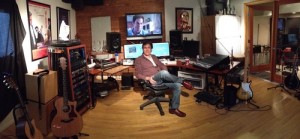Interview: James Levine, Composer of “American Horror Story,” “Royal Pains,” and “Glee”
Posted on May 12, 2014 at 8:00 am
Composer James S. Levine worked on two of my favorite television series, so I was especially delighted to get a chance to speak to him. I love “Glee’s” fabulously curated choral selections. And I love the soundtrack to “Royal Pains,” which so perfectly matches the sun-drenched Hamptons setting and the slight humorous, outsider-y edge of the Lawsons. Levine has also worked on other hit series, including “American Horror Story,” “The Closer,” and “The Blacklist.”
What was the first instrument you ever played?
Piano. I had to ask for piano lessons. I was the youngest of three. I started asking for piano lessons when I was about seven and started when I was about nine. I had this great little local teacher, classical at first. Then I started bringing in pop songs that I wanted to play. My sister was a singer in high school and used to be in musical theater. I wanted to accompany her so I’d learn the song she was singing, show tunes, some pop songs as well.
When I was 13 I switched to a different teacher. I wanted to learn jazz and improvisation and so I switched teachers. He became a mentor to me and I studied with him through college.
What did you study in college?
I decided to get a Bachelors degree in American Studies. I really got into how music functions in society, so I studied music from that perspective. the function of music and culture and then the actual nuts and bolts of musical training I did with this fantastic teacher who I studied with until I was 23.
And when you thinking about music in society, where you very aware of music in movies and television?
Of course, yeah. Totally always very aware of that, sort of loved doing that or thinking about doing that while playing in bands or playing in shows and playing songs, writing songs, that sort of stuff. Sort of anything I could do I would do, that sort of thing.
Why is it that we no longer have the distinctive TV theme songs as we used to in the 60’s and 70’s?
I think that there is this sort of push to get to the show right away so you don’t lose the viewer. And there is a fear of making a definitive statement out of the gate. I think people are afraid that if you establish a tone that’s too specific immediately you might turn off a bunch of people.
One thing I love about Glee is the way it crosses so many categories with the music on the show — pop, rock, hip-hop, show tunes, songbook.
You can’t be afraid of that. I have worked with people, Ryan Murphy being probably one of the most well-known that is not afraid of making a statement and sort of making people uncomfortable and sort of redefining himself with each show. With American Horror Story, each season, we totally reinvent ourselves. So he trusts that you make something that’s compelling.
When you are working on a series like “The Blacklist,” where do you begin?
I think you definitely start with characters and the story and from there I think about themes for characters, I think about the overall tone of the show and sort of what components make up the show. On a lot of these shows like “Major Crimes” or “The Closer,” which I worked on for a long time, there is always the case and then you also have the specific character beats and character pieces and those can help define the character. You sort of ride the line between propelling the case forward in those shows and also getting and giving character information.
Going into a new season of a show, there is always an overall goal of the writers and the creator and producers like this season is going to be about fulfillments and so and so’s drives to find his long lost mother. Okay now within that we are going to have 18 or 22 or 13 episodes of different procedural cases but the overall arc is something that helps you think in a more global sense and sort of maybe grow the music forward a little bit and stretch it.
So just as the writers and the creators might want and usually need to like feel as though they are stretching their muscles and expanding the sort of mythology of the story, that composer can see like we have that opportunity too. You know you have to take chances to do that. So sometimes you might take the chance and be like, “This is not our show! This is unlike anything we do.” And sometimes too like, “Oh, that’s a really cool idea and it totally works!” And it feels like it’s evolving so it’s sort of a case-by-case basis.
 One of the things I love about “Royal Pains” is that it has this very specific setting that is not like anything else on television. How do you think about adding the overall distinctive quality to the music?
One of the things I love about “Royal Pains” is that it has this very specific setting that is not like anything else on television. How do you think about adding the overall distinctive quality to the music?
We keep it breezy and fun and then. The goal at the beginning was to make it light. There’s obviously the medical drama case stuff, which sort of exists in its own way and that’s sort of a procedural element that show so the music sort of functions in that way. But the rest of it is like placing characters. And I always wanted to feel like there is sort of a central core group of four or five characters, a small little breezy sunshiny Jack Johnson, James Taylor, rock band. It’s like sort of an acoustic rock sort of score but it’s evolved and we sort of drift in and out of more serious moments and pull it in either direction. We keep it like a beach party a little bit. To keep the sunshine and all of that. The story gets serious but sometimes you don’t have to play serious on top of serious to get the point across and often times it’s not necessary; because it’s a well-written show and they are good actors.



